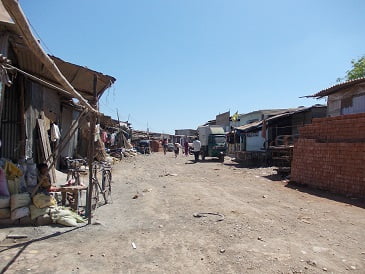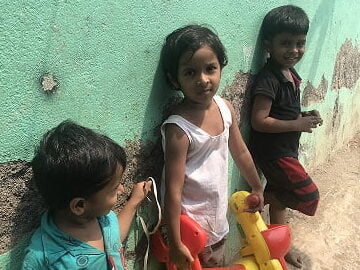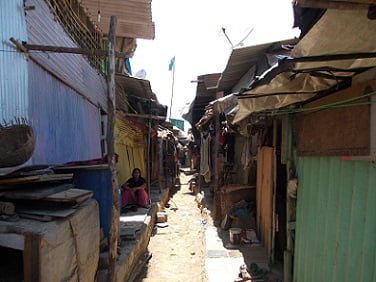Social problem

Economic Poverty
The slums of Mumbai are inhabited by migrant daily wage earners from different parts of India who come to the city with dreams of a better living. They constitute Mumbai’s workforce but are compelled to live in a habitat with no access to drinking water, drainage system, basic sanitation and hygiene or even proper shelter or roads. The migrant population adjusts with a poor quality of life offered by a space crunched city as an alternative to offering livelihood to the male members.
The livelihood of the unskilled male members of the family are mostly daily wage labourers in places of construction and those who can persist the hard work gradually rise in the ranks to become masons. But there is no stability of work and often they work for few days of the month only and this leads a fluctuating financial condition of the family. The skilled male members comprise of tailors who have seasonal spikes and auto drivers who mostly drive someone else’s auto and need to work 14 hours a day every day for a decent earning.
The livelihood of the unskilled male members of the family are mostly daily wage labourers in places of construction and those who can persist the hard work gradually rise in the ranks to become masons. But there is no stability of work and often they work for few days of the month only and this leads a fluctuating financial condition of the family. The skilled male members comprise of tailors who have seasonal spikes and auto drivers who mostly drive someone else’s auto and need to work 14 hours a day every day for a decent earning.
State of Women and Children
The women of these slum deal with the existential challenges on a daily basis and bear the brunt of this poor quality of life coupled with the challenges of a patriarchal social set up which does not allow them to step out or travel far for work. In order to have some money in hand they resort to the readily available form of earning money.
These communities have multiple sources of earning meagre wages. The women are involved in menial labour jobs like assembling keychains, stone pasting which pay meagre amounts, and in order to meet daily deadlines, the women involve the children in these labour jobs. So, a family of 5 members, 3 children and the mother put in 3 hours per person which is a total of 12 hours each day to earn Rs 50 to 70. The communities are the sweat shops for mass manufacturing.
The women and children essentially are part of a vicious cycle in the unorganised sector with unfair wages, unreasonable hours and child labor and lack of benefits. These fulfil the economic deficit temporarily but cannot alleviate poverty in the long term and creates a parallel system of social poverty: income which is transient and driven by daily needs devoid of any long term thought and bereft of dignity. Mostly the women are uneducated or dropouts at an early stage from school and there is no other livelihood opportunity available in the vicinity of their homes.
The women and children essentially are part of a vicious cycle in the unorganised sector with unfair wages, unreasonable hours and child labor and lack of benefits. These fulfil the economic deficit temporarily but cannot alleviate poverty in the long term and creates a parallel system of social poverty: income which is transient and driven by daily needs devoid of any long term thought and bereft of dignity. Mostly the women are uneducated or dropouts at an early stage from school and there is no other livelihood opportunity available in the vicinity of their homes.


Social Poverty
Due to lack of knowledge and awareness of government schemes and policies, the hard-earned money gets misused by several racquets which operate in the slum and dupe the people in the name of saving.
Some families do not have the economic means to educate 3 to 4 children and coupled with the lack of knowledge of what possibilities education can lead to, makes it even more difficult to build aspiration for educating the children beyond a certain grade. The availability of hundreds of options to earn quick money, without much education, seems more lucrative, that investing in a child’s education beyond the free grade.
This encourages a mindset which is used to living in deficit. Many families receive freebies donated from time to time – an impediment in the way of actual poverty reduction and social change. This perpetuates the cycle of poverty and the victim mindset which prevents people from owning the problem and thinking of solving it themselves.
Some families do not have the economic means to educate 3 to 4 children and coupled with the lack of knowledge of what possibilities education can lead to, makes it even more difficult to build aspiration for educating the children beyond a certain grade. The availability of hundreds of options to earn quick money, without much education, seems more lucrative, that investing in a child’s education beyond the free grade.
This encourages a mindset which is used to living in deficit. Many families receive freebies donated from time to time – an impediment in the way of actual poverty reduction and social change. This perpetuates the cycle of poverty and the victim mindset which prevents people from owning the problem and thinking of solving it themselves.
